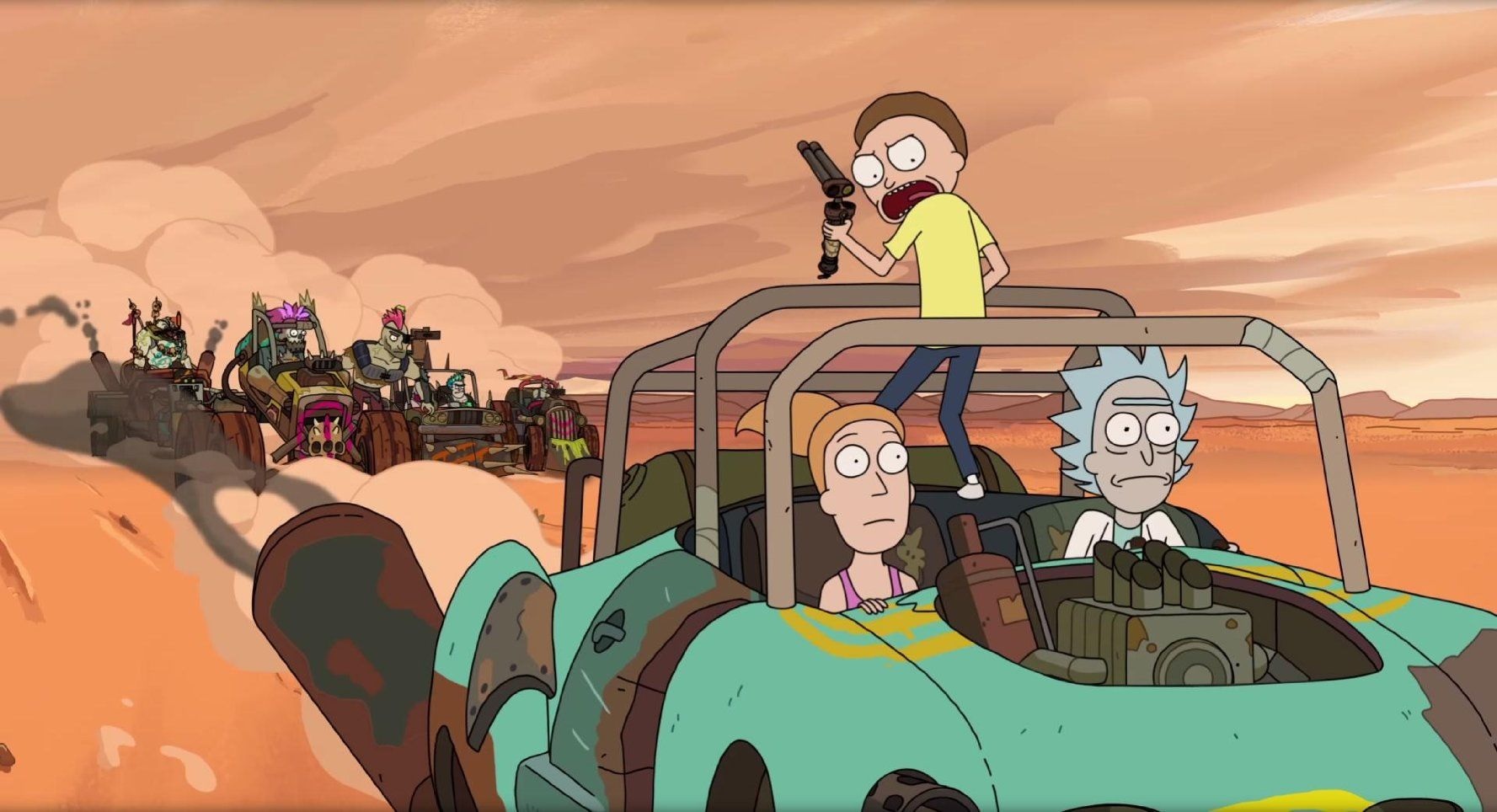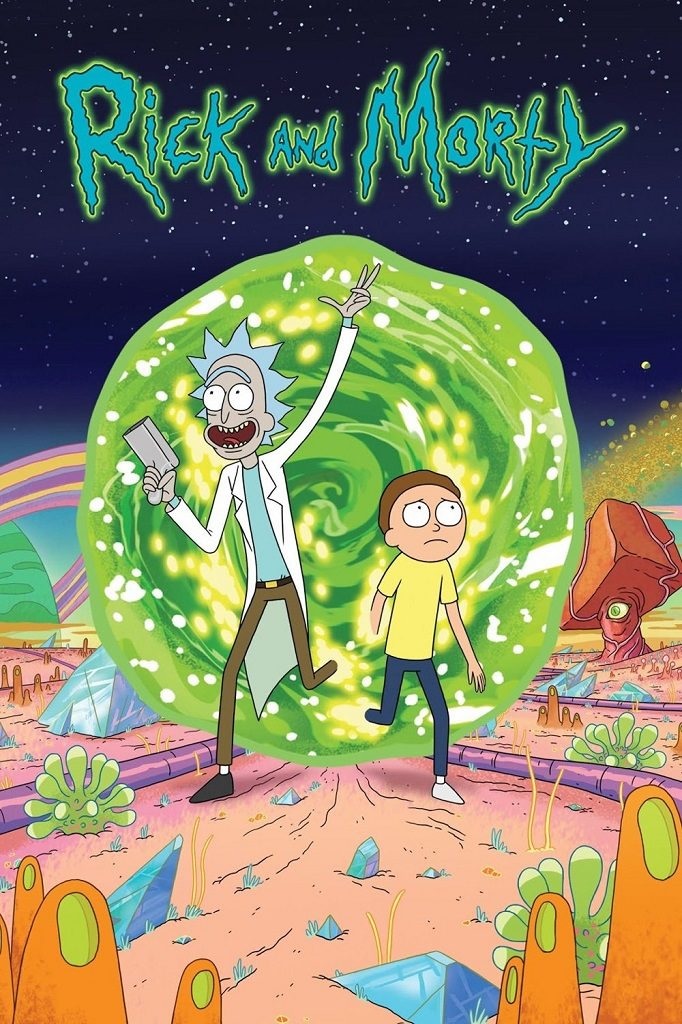Following his elaborate escape from space prison, Rick is (for better or for worse) back at home with his family, with his arrival shaking things up enough to lead to his daughter Beth and Jerry getting a divorce. From there, it’s back to normal everyday life, with Rick taking his grandchildren to another dimension to get a powerful rock he needs, which leads to Summer joining a gang and Morty getting a sentient fist on a Death Wish-style quest for revenge. As a result of this, Rick creates robot duplicates of the family in order to keep a now always intoxicated Beth from realizing they are gone. So, you know, the usual.

When I reviewed the Season Two premiere of Rick and Morty two years ago (yes, it’s been a long time since we had new episodes), the series had maybe achieved a cult level of a fan base, but was far from being something everyone was talking about. Since then, though, this crazy cartoon has exploded on a pop culture level, dominating Hot Topic stores and even getting its own Monopoly game. Rick and Morty is finally as popular as it deserves to be, but with great popularity comes great expectations. Would Rick and Morty be able to live up to the hype for the third time in a row?
Thankfully, the answer is a resounding, triumphant yes. Rick and Morty is not only just as good as it was before, it may even actually be better. It’s hard to think of any comedy series, live-action or animated, which has managed to maintain such a level of an insane brilliance episode-after-episode, but this show has managed to not only pull it off, but also make it appear effortless. And even with its reputation as one of the best cartoon shows on television for adults, it still finds ways to keep surprising its audience. It’s almost something of a miracle of television.
One of the most remarkable things about the series is how much the creators are able to pack into each episode. In my review of Despicable Me 3, I noted that the film suffered because it was attempting to do too much at once. That is never the case with Rick and Morty, in which ten different things can be happening simultaneously and still amount to something that’s highly entertaining and even kinda profound. For instance, Rickmancing the Stone begins as a parody of Mad Max: Fury Road before turning into a spoof of Mad Max: Beyond Thunderdome, which then evolves into Morty getting a conscious fist which sends him on a punching spree against his will, while Summer gets romantically involved with a self-proclaimed nihilistic killer, while Rick’s robot versions of the family (in the “real world”) attempt to keep a morbidly depressed Beth pleased while the android Morty begins to go through an A.I. complex. On almost any other cartoon, this would be a recipe for disaster, but Rick and Morty has a secret ingredient behind its endless comedic violence and chaos: grounding everything in something relatable.

This has always been a key aspect behind the show’s success, but this season takes everything in a more daring turn: the center of everything, in this case, is the depressing experience children go through when their parents become divorced. This is an extremely risky move I was initially worried about (let’s face it, divorce isn’t usually an ideal topic for comedy), but Rickmancing The Stone handles it with a subtle yet meaningful amount of sensitivity. The divorce is sad, and though it’s the source of a good number of the episode’s gags, it’s also what’s driving (or bringing down) all of the characters. For Morty, it’s anger towards Jerry he’s not wanting to acknowledge that he wasn’t able to fight harder to keep the marriage alive (anger that he is able to get out of his system, to a certain extent, via his vengeful fist). For Summer, it’s also anger, but blame towards her mother for initiating the divorce, and for perhaps being too hard on her dad over the years. It’s notable that for all the gleeful carnage the episode provides, it ends not with an extended joke, but with a scene of a daughter hugging her now lost father, a hug which the father isn’t sure how to respond to. And at the core of it all is Rick, who ultimately caused the divorce with his return and Jerry making an attempt to put his foot down saying that the family had no reason to deal with him anymore after he got the planet taken over by galactic overlords. The impact this has had on Rick remains unknown, especially since the last episode concluded with him giving a drunken, fourth-wall breaking rant in which he claimed to Morty that he orchestrated the divorce as part of his plan to finally get his hands on long gone Mulan-themed dipping sauce from McDonald’s.
Of course, Beth and Jerry getting back together is probably inevitable, which would be welcome. But the fact that Rick and Morty has been able to handle them splitting up without coming across as mean-spirited or tasteless speaks volumes about what this show is capable of. If you’re not already watching Rick and Morty, then you’re missing out on what might be Adult Swim’s greatest cartoon series of all time, and I am one of many people who hopes this hilarious, twisted, depressing, poignant, violent, heartwarming show is around for many seasons to come. Wuba-luba-dub-dub!
 | Rick & Morty Adult Swim Sundays at 11:30 PM ET 22 minutes Rated TV-14 Created by Justin Roiland and Dan Harmon | |











